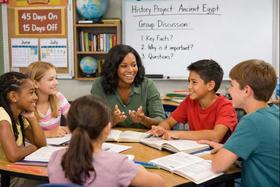For the 2026 school year, there are 8 public schools serving 5,173 students in 28314, NC (there are 4 private schools, serving 955 private students). 84% of all K-12 students in 28314, NC are educated in public schools (compared to the NC state average of 92%).
The top-ranked public schools in 28314, NC are Alpha Academy, E E Miller Elementary School and Bill Hefner Elementary School. Overall testing rank is based on a school's combined math and reading proficiency test score ranking.
Public schools in zipcode 28314 have an average math proficiency score of 41% (versus the North Carolina public school average of 51%), and reading proficiency score of 45% (versus the 50% statewide average). Schools in 28314, NC have an average ranking of 4/10, which is in the bottom 50% of North Carolina public schools.
Minority enrollment is 89% of the student body (majority Black), which is more than the North Carolina public school average of 57% (majority Black and Hispanic).
Best 28314, NC Public Schools (2026)
School
(Math and Reading Proficiency)
(Math and Reading Proficiency)
Location
Quick Facts
Rank: #11.
Alpha Academy
Charter School
(Math: 59% | Reading: 61%)
Rank:
Rank:
8/
Top 30%10
8030 Raeford Road
Fayetteville, NC 28314
(910) 223-7711
Fayetteville, NC 28314
(910) 223-7711
Gr: K-12 | 1,043 student Student-teacher ratio: 23:1 Minority enrollment: 89%
Rank: #22.
E E Miller Elementary School
(Math: 50% | Reading: 51%)
Rank:
Rank:
6/
Top 50%10
1361 Rim Road
Fayetteville, NC 28314
(910) 868-2800
Fayetteville, NC 28314
(910) 868-2800
Gr: PK-5 | 624 students Student-teacher ratio: 14:1 Minority enrollment: 84%
Rank: #33.
Bill Hefner Elementary School
(Math: 43% | Reading: 47%)
Rank:
Rank:
5/
Bottom 50%10
7059 Calamar Drive
Fayetteville, NC 28314
(910) 860-7058
Fayetteville, NC 28314
(910) 860-7058
Gr: PK-5 | 715 students Student-teacher ratio: 16:1 Minority enrollment: 83%
Rank: #44.
Lake Rim Elementary School
(Math: 40% | Reading: 46%)
Rank:
Rank:
4/
Bottom 50%10
1455 Hoke Loop Road
Fayetteville, NC 28314
(910) 867-1133
Fayetteville, NC 28314
(910) 867-1133
Gr: PK-5 | 647 students Student-teacher ratio: 15:1 Minority enrollment: 88%
Rank: #55.
Anne Chesnutt Middle School
(Math: 34% | Reading: 43%)
Rank:
Rank:
4/
Bottom 50%10
2121 Skibo Road
Fayetteville, NC 28314
(910) 867-9147
Fayetteville, NC 28314
(910) 867-9147
Gr: 6-8 | 467 students Student-teacher ratio: 15:1 Minority enrollment: 89%
Rank: #66.
Montclair Elementary School
(Math: 35-39% | Reading: 30-34%)
Rank:
Rank:
3/
Bottom 50%10
555 Glensford Drive
Fayetteville, NC 28314
(910) 868-5124
Fayetteville, NC 28314
(910) 868-5124
Gr: PK-5 | 448 students Student-teacher ratio: 13:1 Minority enrollment: 89%
Rank: #77.
Lewis Chapel Middle School
(Math: 31% | Reading: 38%)
Rank:
Rank:
3/
Bottom 50%10
2150 Skibo Road
Fayetteville, NC 28314
(910) 864-1407
Fayetteville, NC 28314
(910) 864-1407
Gr: 6-8 | 580 students Student-teacher ratio: 14:1 Minority enrollment: 94%
Rank: #88.
Cliffdale Elementary School
(Math: 27% | Reading: 34%)
Rank:
Rank:
2/
Bottom 50%10
6450 Cliffdale Road
Fayetteville, NC 28314
(910) 864-3442
Fayetteville, NC 28314
(910) 864-3442
Gr: PK-5 | 649 students Student-teacher ratio: 14:1 Minority enrollment: 94%
Frequently Asked Questions
What are the top-ranked public schools in 28314, NC?
The top-ranked public schools in 28314, NC include Alpha Academy, E E Miller Elementary School and Bill Hefner Elementary School.
How many public schools are located in 28314?
8 public schools are located in 28314.
What percentage of students in 28314 go to public school?
84% of all K-12 students in 28314 are educated in public schools (compared to the NC state average of 92%).
What is the racial composition of students in 28314?
28314 public schools minority enrollment is 89% of the student body (majority Black), which is more than the North Carolina public schools average of 57% (majority Black and Hispanic).
Recent Articles

Year-Round Schooling in 2026: Updated Parent Guide
Explore the latest 2026 data, trends, costs, and parent planning tips in the ongoing debate over year-round schooling vs the traditional calendar.

No Child Left Behind: Past, Present, and Future of U.S. School Policy
Explore how No Child Left Behind evolved into ESSA, what it means for 2025‑26 schooling, and what parents need to know about testing, admissions planning, and funding.

Understanding Public School Fees & Optional Costs Guide
Discover what public school fees are required versus optional, with 2026 updates for parents, students, and educators on budgeting and planning.
